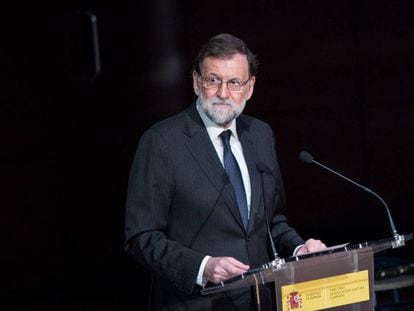Can Puigdemont be sworn in as the next Catalan premier?
Ousted leader remains the only candidate, but his success depends on being physically present at parliament

Uncertainty and tension over Catalonia reached new highs on Tuesday morning, when the speaker of the Catalan parliament announced that he was delaying the afternoon investiture debate to elect a new head of government following the December 21 elections.
Ousted premier Carles Puigdemont, who fled Spain after the illegal independence declaration of late October and is now living in self-imposed exile in Belgium, is hoping to get reappointed with the votes of his own Junts per Catalunya, the Catalan Republican Left (ERC) and the far-left CUP party. Together, these forces secured a majority at the election even though the pro-unity Ciudadanos was the most-voted party.
But the Spanish Constitutional Court has clearly stated that a remote or proxy appointment is not legal, and that Puigdemont will have to come personally to the chamber to participate in the debate; before that, he needs to secure authorization from the Supreme Court judge investigating him and other former Catalan government officials for possible crimes of sedition, rebellion and misuse of public funds.
Puigdemont has been staying away from Spain, where he faces arrest after he failed to show up at his hearing last year in connection with this case. It is unclear whether he is planning to make an appearance in the Catalan parliament, or whether he will seek a long-distance appointment.
Speaker Roger Torrent has not yet announced a new date for the investiture session, but warned that he will “go all the way to guarantee the rights of Premier Puigdemont,” and that he will not propose any other candidate.
The Spanish government is considering several possible scenarios:
Plenary session without Puigdemont
Remote appointment: If separatists use their majority in the speaker’s committee to allow a remote appointment to take place inside the chamber, they will be in violation of the law, as the Constitutional Court noted again this past weekend. In this event, opposition groups will in all likelihood ask for the session to be placed on hold until the candidate meets the legal criteria. If the committee ignores this request, either the Spanish government or one of several parliamentary groups will likely challenge the move before the Constitutional Court. Such a scenario would yield images of opposition groups walking out of the chamber during the vote in protest, mirroring last year’s sessions to pass self-made laws.
Puigdemont returns to Spain
There is an arrest warrant out for Carles Puigdemont, who would be detained upon arrival in Spain. In order to legally attend the investiture debate, he is required to appear personally before Supreme Court judge Pablo Llarena and seek authorization to do so. But this is unlikely, since Puigdemont’s lawyer, Jaume Alonso-Cuevillas, has described these conditions as “a monstrosity.” Following the December 21 election, Alonso-Cuevillas stated that “the only option for getting him appointed is to return, even if that means arrest.”
If Puigdemont shows up before the judge and the latter grants authorization, Puigdemont would sit in the Catalan parliament like any other deputy and the session would go ahead. He would need 68 votes for an absolute majority, a number that requires support from the four CUP deputies. Failure to secure this support would lead to a second vote where only a simple majority is needed for the candidate to be successful.
If Puigdemont shows up before the judge and the latter does not grant authorization, the ousted premier would be taken into custody just like his former deputy Oriol Junqueras, former interior affairs chief Joaquim Forn and the heads of two civic associations that actively promoted secessionist actions.
Prison and appointment: Puigdemont could also return and, after being transferred to prison, request permission from the judge to read his speech before the Catalan parliament. There is a precedent for this: in 1987 Herri Batasuna, the political wing of the Basque terrorist group ETA, nominated jailed ETA member Juan Carlos Yoldi to be the Basque premier.
What comes next?
If the outcome of a vote returning Puigdemont to power gets cancelled over legal issues, a two-month period will open up to find and name a new head of government. Junts per Catalunya would probably seek to nominate one of its own deputies, while ERC would say that the time has come for their own jailed leader, Oriol Junqueras, to bid for the post. Junqueras could request a leave to attend the investiture debate, and he could also be released on parole.
If no successful candidate emerges in two months, the Catalan parliament will be automatically dissolved and Spanish Prime Minister Mariano Rajoy would call another regional election.
If the Constitutional Court were to cancel not just the outcome of the investiture vote but the vote itself, the two-month period would not apply, and Catalan politics would enter a time-out without precedent in Spain’s democratic history.
The rebellion probe
If Puigdemont returns to power, he and his former officials will still be facing the Supreme Court investigation, which will likely go to trial in the fall. The charges they face carry prison terms and bans from holding public office, which would make it difficult to run a government. In such an event, the law stipulates that a new election can be called within a year of the previous one.
English version by Susana Urra.












































